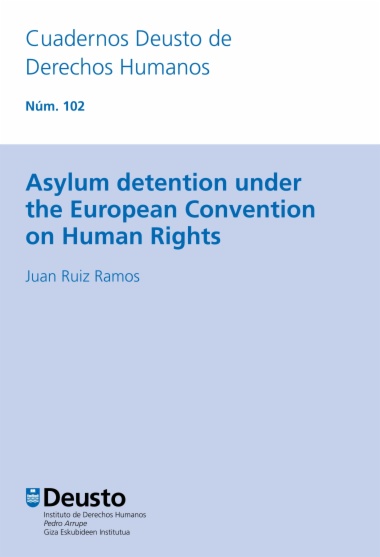The detention of migrants who have not committed a crime is one of the most disturbing contemporary practices from the point of view of human rights (Costello 2015). Administrative detention of asylum-seekers poses an additional problem: it causes an independent deterioration of the mental health of people who are (potentially) already highly traumatised (Filges et al. 2015). The intention of this book is to systematise in a comprehensive manner the obligations that States owe to detained asylum-seekers under the European Convention on Human Rights (ECHR). This objective is pursued through an analysis of the judgments of the European Court of Human Rights (ECtHR) regarding Article 5 (right to liberty and related rights, such as the right to a judicial review of the detention) and Article 3 ECHR (conditions of detention) in cases in which the applicant was an asylum-seeker. This case law review is placed within the broader context of the human rights guarantees offered by the Refugee Convention and the International Covenant on Civil and Political Rights (ICCPR). The book also seeks to identify whether the tighter migration control policies pushed for by European Union Member States after 2015 impacted the Court’s case law on asylum detention. With this twofold approach, it hopes to serve as a guide for strategic litigation before national courts and the ECtHR, as well as to contribute to the academic debate on how the European Court could raise its standards of protection in migration-related cases.
- Cover
- Title page
- Copyright page
- Contents
- Table of Cases
- Introduction
- 1. The problem of immigration and asylum detention
- 2. Asylum detention in Europe during and after the refugee crisis
- 3. Purpose of the study, theoretical framework and research question
- 4. Methodology, structure and choice of terms
- Preliminary Chapter The right to liberty of asylum-seekers under the Refugee Convention and the ICCPR
- Chapter I. The right to liberty of asylum-seekers under the European Convention on Human Rights
- 1. The grounds for detention of asylum-seekers
- 1.1. The first limb: preventing asylum-seekers’ “unauthorised entry”
- 1.2. The second limb: detaining asylum-seekers “with a view to
deportation”
- 2. The lawfulness of the detention and the prohibition of arbitrariness
- 2.1. Compliance with national law
- 2.2. Compliance with international law… and EU law?
- 2.3. Compliance of national law with the ECHR
- 2.4. The prohibition of arbitrariness
- 2.5. The lack of a full proportionality test
- 3. The duration of detention
- 4. Detention of vulnerable asylum-seekers
- Chapter II. Liberty-related rights under the European Convention on Human Rights
- 1. The right to a judicial review of the detention: Article 5.4
- 2. The right to information (Article 5.2) and the right to compensation (Article 5.5)
- 2.1. The right to be informed of the reasons for detention
- 2.2. The right to compensation
- 3. Conditions of detention
- 3.1. Transversal issues: duration of the treatment, purpose of the treatment and physical and mental effects
- 3.2. Overcrowding
- 3.3. Well-being of the detainee
- 3.3.1. Basic hygIene requirements and privacy
- 3.3.2. ventilation, light and heating
- 3.3.3. access to outdoor exercise and organiSed activities
- 3.3.4. quality of the food
- 3.4. Conditions of detention for vulnerable asylum-seekers
- 3.5. Burden of proof and the duty to investigate
- 3.6. Article 3 and the management of a migration crisis. Special mention to J.R. and Others v. Greece
- Conclusions
- References

